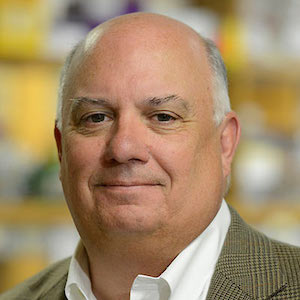Paul A. Welling

Paul A. Welling
North American CoordinatorJoseph S. and Esther Handler Professor
Website |


Johns Hopkins Medical School
Department of Medicine and Physiology
Nephrology Division
720 Rutland Ave Ross 1167B
Baltimore, MD 21287, USA
F: +1 410 706 8341
Paul A. Welling, M.D. is the Joseph S. and Esther Handler Professor of Medicine, at Johns Hopkins University School of Medicine and the North American Coordinator of the Foundation Leducq Global Network of Excellence to understand the relationship between dietary potassium and blood pressure. He received his medical degree from the University of Kansas Medical School and completed his post-doctoral training at Yale University School of Medicine. Dr. Welling is an authority on the molecular bases of potassium and sodium balance, electrolyte disorders, and hypertension.
Dr. Welling’s laboratory is recognized for elucidating how ion transport molecules in the kidney control salt balance and discovering how these molecules go awry in disorders of electrolyte balance and hypertension. A major focus of Dr. Welling’s current research program seeks to understand how the kidney senses dietary potassium to regulate potassium, salt balance, and prevent high blood pressure. His research, which spans from gene discovery to animal studies to clinical-translational investigation, has been continuously funded by the National Institutes of Health (25 years) since his appointment on the faculty at Maryland.
Dr. Welling has served in many leadership and scientific advisory roles. Currently, he is a chair of the NIH study section, Kidney Molecular Biology, and Development. He is chair of the American Physiological Society Finance Committee. He is a Fellow of the American Heart Association (AHA) and is an elected Fellow of the American Association for the Advancement of Science. In his spare time, he enjoys cooking, gardening and traveling.
Publications
- Dietary potassium stimulates Ppp1Ca-Ppp1r1a dephosphorylation of kidney NaCl co-transporter and reduces blood pressure.
Grimm PR, Tatomir A, Rosenbaek LL, Kim BY, Li D, Delpire EJ, Fenton RA, Welling PAJ Clin Invest. 2023 Sep 7:e158498. doi: 10.1172/JCI158498. Epub ahead of print. PMID: 37676724.
[Article] - Dietary anions control potassium excretion: it is more than a poorly absorbable anion effect.
Al-Qusairi L, Ferdaus MZ, Pham TD, Li D, Grimm PR, Zapf AM, Abood DC, Tahaei E, Delpire E, Wall SM, Welling PA Am J Physiol Renal Physiol. 2023 Sep 1;325(3):F377-F393. doi: 10.1152/ajprenal.00193.2023. Epub 2023 Jul 27. PMID: 37498547. [Article] - Pendrin regulation is prioritized by anion in high-potassium diets.
Tahaei E, Pham TD, Al-Qusairi L, Grimm R, Wall SM, Welling PA.Am J Physiol Renal Physiol. 2023 Mar 1;324(3):F256-F266. doi: 10.1152/ajprenal.00128.2022. Epub 2023 Jan 19. PMID: 36656986; PMCID: PMC9942896.
[Article] - Randomized Trial on the Effect of Oral Potassium Chloride Supplementation on the Thiazide-Sensitive Sodium Chloride Cotransporter in Healthy Adults.
Wu A, Wolley MJ, Mayr HL, Cheng L, Cowley D, Li B, Campbell KL, Terker AS, Ellison DH, Welling PA, Fenton RA, Stowasser M Kidney Int Rep. 2023 Mar 27;8(6):1201-1212. doi: 10.1016/j.ekir.2023.03.011. PMID: 37284683; PMCID: PMC10239795. [Article] - Dissociation of sodium-chloride cotransporter expression and blood pressure during chronic high dietary potassium supplementation.
Little R, Murali SK, Poulsen SB, Grimm PR, Assmus A, Cheng L, Ivy JR, Hoorn EJ, Matchkov V, Welling PA, Fenton RA JCI Insight. 2023 Mar 8;8(5):e156437. doi: 10.1172/jci.insight.156437. PMID: 36719746; PMCID: PMC10077486. [Article] - n Primary Aldosteronism Acute Potassium Chloride Supplementation Suppresses Abundance and Phosphorylation of the Sodium-Chloride Cotransporter.
Wu A, Wolley MJ, Matthews A, Cowley D, Welling PA, Fenton RA, Stowasser M. Kidney360. 2022 Aug 26;3(11):1909-1923. doi: 10.34067/KID.0003632022. PMID: 36514401; PMCID: PMC9717638. [Article] - Acute Intravenous NaCl and Volume Expansion Reduces Sodium-Chloride Cotransporter Abundance and Phosphorylation in Urinary Extracellular Vesicles.
Wu A, Wolley MJ, Wu Q, Cowley D, Palmfeldt J, Welling PA, Fenton RA, Stowasser M. Kidney360. 2022 Mar 1;3(5):910-921. doi: 10.34067/KID.0000362022. PMID: 36128481; PMCID: PMC9438418. [Article] - Does the early aldosterone-induced SGK1 play a role in early Kaliuresis?
Al-Qusairi L, Basquin D, Stifanelli M, Welling PA, Staub O. Physiol Rep. 2022 Feb;10(4):e15188. doi: 10.14814/phy2.15188. PMID: 35224872; PMCID: PMC8883148. [Article] - Pendrin-null mice develop severe hypokalemia following dietary Na+ and K+ restriction: role of ENaC.
Pham TD, Elengickal AJ, Verlander JW, Al-Qusairi L, Chen C, Abood DC, King SA, Loffing J, Welling PA, Wall SM. Am J Physiol Renal Physiol. 2022 May 1;322(5):F486-F497. doi: 10.1152/ajprenal.00378.2021. Epub 2022 Feb 28. PMID: 35224991; PMCID: PMC8977139. [Article] - Low Salt Delivery Triggers Autocrine Release of Prostaglandin E2 From the Aldosterone-Sensitive Distal Nephron in Familial Hyperkalemic Hypertension Mice.
Zapf AM, Grimm PR, Al-Qusairi L, Delpire E, Welling PA. Front Physiol. 2022 Jan 6;12:787323. doi: 10.3389/fphys.2021.787323. PMID: 35069250; PMCID: PMC8770744. [Article]
